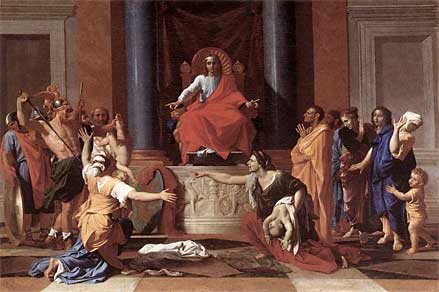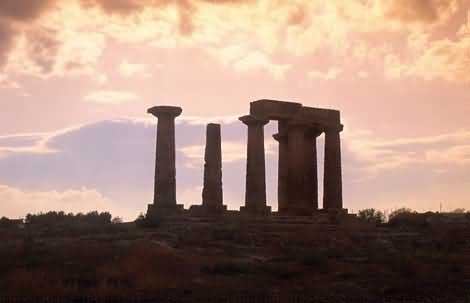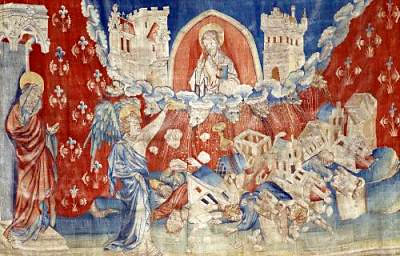May
12
2010

Thoughts on 2 Corinthians 4
For God, who said, “Let light shine out of darkness,” made his light shine in our hearts to give us the light of the knowledge of the glory of God in the face of Christ.
The chapter follows the Creation pattern. Here are the governors of Day 4, the people of God filled with the Law of God at Pentecost. They become the eyes of God. (See Eye Spy – 1: The Insiders).
But we have this treasure in jars of clay to show that this all-surpassing power is from God and not from us.
Continue reading
Comments Off | tags: Bible Matrix, Isaiah, Judges, Lampstand, Literary Structure, Paul, Pentecost, Resurrection | posted in Biblical Theology, The Last Days
May
11
2010
Thoughts on 2 Corinthians 4

One thing I have realised over the last few years is how little the New Testament is commonly taught in the context of God’s “worship economy.” This is mostly due to the fact that the destruction of the Herods’ temple—or at least its significance—doesn’t even register on most Bible college lecturers’ radar, let alone that of the average Christian. We understand why the temples of the pagan gods were abandoned. Do we understand that the Temple of the true God had become a synagogue of Satan?
Continue reading
Comments Off | tags: Commentary, Corinthians, Literary Structure, Paul | posted in Biblical Theology, Christian Life
May
10
2010
or Feasts in Psalm 116

I love the LORD, because He has heard my voice and my supplications. Because He has inclined His ear to me, therefore I will call upon Him as long as I live.
Continue reading
Comments Off | tags: Bible Matrix, Feasts, Literary Structure, Psalms | posted in Biblical Theology
Apr
12
2010

Timothy Edwards has some really interesting things to say about interpreting Psalm 1 over at Credenda/Agenda. Of course, I thought the matrix might help things as well. Here’s my go at it.
Continue reading
1 comment | tags: Bible Matrix, Fractals, Literary Structure, Psalms | posted in Biblical Theology
Mar
9
2010

or Understanding Apostolic Wine Science
Scholars talk about identifying the “apostolic hermeneutic,” which sounds intimidating. The reason for this phrase is that according to the commonsense rules of interpretation, the apostles are merrily delinquent. They quote many Old Testament texts, rip them out of their historical contexts and claim they are fulfilled in Christ.
Our problem is that the apostles are neither hacks nor mystics. They are authoritative. Some rightly explain that the apostles are just seeing Christ prefigured in the Old Testament Scriptures, which they are, but this explanation is too vague. God’s Word is meticulous.
Continue reading
Comments Off | tags: C. S. Lewis, Hermeneutics, Literary Structure | posted in Biblical Theology
Feb
22
2010
or Show Me the Tropes

Literary agent Peter Rubie would undoubtedly have read many story synopses, both fiction and non-fiction. His colleague Janet Reid advises that anyone wishing to write a bestseller should read at least two thousand novels before attempting to write their own. Peter gives some helpful advice:
Continue reading
Comments Off | tags: C. S. Lewis, Culture, Feasts, Joke, Literary Structure | posted in Biblical Theology
Jan
28
2010

36. Acording to Preterists, all those left in Jerusalem were reckoned unholy. But see Isaiah 4:3-4.
Simple answer: Isaiah 4 refers to the “new Jerusalem” of Ezra and Nehemiah. But I’m going to use this as an opportunity to analyse Isaiah 4 and its context. This stuff blows me away.
Continue reading
Comments Off | tags: Bible Matrix, Ezra, Feasts, Isaiah, Jeremiah, Literary Structure, Nehemiah | posted in Against Hyperpreterism, Biblical Theology, The Last Days, The Restoration Era
Jan
26
2010
or James Jordan’s Big Hammer
 “My God, it’s full of stars!”
“My God, it’s full of stars!”
One of the reasons I appreciate James Jordan is his ability to identify the “universals” in Scripture. Understanding these recurring themes answers many questions and solves many mysteries. These universal “roles” and events all point forward to the events of the first century. For instance, we cannot understand what the apostles meant by the phrase “the sons of God” without checking its history in the Old Testament. [1]
The danger with dealing in all the “big picture” stuff is that it can become self-serving. The heart is deceitfully wicked, and theology can become a kind of escapism, an ideology. Like the worst of the 20th century’s political ideologies, it can be divorced from reality so that in practice it rides roughshod over people to achieve its goals. Any big theology must maintain a big pastoral heart.
[This post has been refined and included in Sweet Counsel: Essays to Brighten the Eyes.]
Continue reading
2 comments | tags: Doug Wilson, James Jordan, Literary Structure, Postmillennialism, Typology | posted in Biblical Theology, Christian Life
Jan
26
2010
31. The remnant of Israel still practices iniquity (Zeph. 3: 13).
Drew was right. Some of these really are weak. Zephaniah denounces Judah for her indulgence in idolatry and luxury while she presumed the Lord would protect her. He predicts a new Jerusalem without these sins. All fulfilled. Ripping the prophets out of context and applying them to modern “Jews” is not only infantile exegesis, it removes most of the Bible from the real world so it can apply to some future Jews. God doesn’t work that way. He warns, waits a generation, then judges. Always. Same thing goes for the Revelation.
Continue reading
Comments Off | tags: AD70, Feasts, Literary Structure, Zechariah | posted in Biblical Theology, The Last Days
Jan
7
2010

Revelation can’t be fully appreciated without attention to its literary structure. I’m no expert, but have a gander at this…
Continue reading
4 comments | tags: AD70, Atonement, David Chilton, Feasts, James Jordan, Literary Structure, Pentecost, Revelation | posted in Biblical Theology, The Last Days, Totus Christus


































